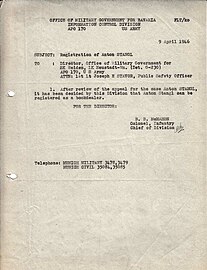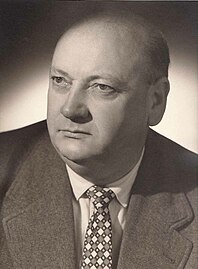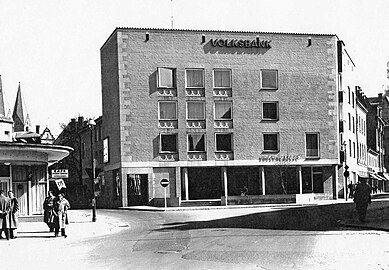G. Taubaldsche Buchhandlung
The G. Taubaldsche bookstore (from 1989 bookstore Stangl & Taubald ) was a company in Weiden . It was founded in 1864 by Edmund Straub and was one of the oldest continuously existing bookshops in Germany .
The Taubald publishing house, which published works by the composer Max Reger , had also existed since the 19th century . In addition, publications about Upper Palatinate local history, historical postcards and regional cookbooks were published . In 1991 the publisher brought out the historical chronicle of the city of Weiden by Wilhelm Brenner-Schäffer (1814–1881) and in 2014 the reprint of the first printed chronicle of the city of Weiden by forester Josef Sintzel (* 1798 Weiden).
history
The history of the bookstore began on September 21, 1864, when Edmund Straub from Augsburg opened his bookstore at Türlgasse 2, which was announced in the Official Gazette No. 76 of the Weiden District Court in Upper Palatinate.
Already on October 9, 1867, Straub reported to the magistrate "that he had ceded to Mr. Gustav Taubald from Bodenwöhr ". On November 23, 1867, the takeover of the bookstore by the new owner was announced in Official Gazette No. 94. The topography of the royal district of Vohenstrauß , written by Sebastian Wallner , appeared as early as 1876 . A little later Albert Vierling's memoirs were published from the Upper Palatinate .
Born in Switzerland, Conrad Ogg took over the bookstore at the Old Town Hall on January 1, 1882, “because of Gustav Taubald's constant sickness”. In the years between 1898 and 1901, the composer Max Reger went in and out of Ogg's house almost every day. After his conflict-ridden time in Wiesbaden, he sought relaxation in his parents' house in Weiden. Reger helped unpack the bales of books coming from Leipzig every Friday . "What particularly interested him in the field of modern poetry was dragged home with him for closer inspection and occasional later use." Adalbert Lindner, Reger's teacher during his time in Weiden, reports that Reger was in the Taubaldschen bookstore with the works of Otto Julius Bierbaum , Detlev von Liliencron , Richard Dehmel , Karl Henkell and Arno Holz came into contact, who would later give him the tools for his so numerous song creations. Ogg also published one of Reger's songs, the lullaby Schließe, mein Kind, die Äuglein zu, for a medium voice with the accompaniment of the pianoforte, “Frau Elsa von Bercken , geb. von Bagenski, devotedly dedicated ”. Berlin, 1910, composed in Weiden in 1898. Lindner reports on Ogg and Reger's last meeting in the Taubaldschen bookstore on August 30, 1901: This is how the inexorably ... fixed dividing hour came. ... At nine and a half o'clock we were at the bookseller Conrad Ogg, who had been friends for years, where Reger ... helped unpack every Friday. This time it should be the last. With more humor than ever before, he did it today. There was a lot of gallows humor there.
In addition to various local historical works, the bookseller and publisher Ogg also issued various postcards in the publishing house of the G. Taubaldschen Buchhandlung. In addition, he founded the C. Ogg publishing house from which postcards in the moonlight card look customary around 1900 have been preserved.
- Historical postcards from the publisher
Due to a stroke, Konrad Ogg had to give up his job on May 1, 1918 and handed it over to the Munich bookseller Gustav Hofmann. Already at the beginning of 1920 he switched to Anton Winkler (* September 12, 1887, † August 17, 1952).
On January 1, 1949, Anton Winkler handed over the business to his daughter Maria Mühlbauer, who continued the G. Taubaldsche Buchhandlung until July 1, 1980. For reasons of age, she sold to a colleague from Weiden, Heinrich Stangl (1931–1986), who was the second generation to run the Stangl bookstore founded in 1926. During the Winkler / Mühlbauer era, there was hardly any noteworthy publishing activity.
This was founded by Anton Stangl (* March 6, 1907, † January 26, 1962) together with his wife Maria (née Schnabl, * December 21, 1906, † September 3, 1993) in 1926. This establishment of the company was preceded by years of sideline sales of Bibles and Catholic prayer books . The main product range of this bookstore was determined by denomination. This gave rise to difficulties for Anton Stangl during the National Socialist era, which meant that the bookstore was temporarily closed in 1944. Unimpressed by this, he continued his business. In the files of the Amberg State Archives on the arbitration chamber proceedings against Anton Stangl, it can be read that the founder of the business did not belong to any National Socialist organization. The reasons for the verdict were literally: "Without any burden."
- New beginning after the Second World War
The Catholic product range orientation, which was unusual for that time, brought the bookseller great success in the traditionally Catholic Upper Palatinate . After the end of the war, the American military government became suspicious ( war profiteers ) and initially refused him the license he needed to continue his business. Catholic clergy and Erich Kästner , head of the arts section at Die Neue Zeitung, encouraged the bookseller to reopen the shop. It was not until April 9, 1946 that he received the necessary "registration". After the war, Anton Stangl also worked as a publisher. In addition to the printing of postcards, his main focus was the publication of religious writings.
- Bookstore owner
In 1957, son Dr. Heinrich Stangl (* May 22, 1931, † August 20, 1986), after completing his degree in philosophy and an apprenticeship as a bookseller at Verlag Herder , joined the bookstore with his wife Clothilde (née Erle, * 1935). On July 1, 1976, he acquired the bookstore of the same name opened by Alois Belzer on November 8, 1946 at Schulgasse 21 and continued to operate it under the name of Buchhandlung Stangl. After the death of Heinrich Stangl, Andreas (* March 30, 1964, † June 16, 2014) and Martin Stangl (* 1961) with wife Alexandra (née Haynaly, * 1962) succeeded them.
Since the management of Martin Stangl, the publishing activities under the name Verlag Stangl & Taubald have been expanded considerably. With the book about the Flossenbürg concentration camp under the title "30,000 Dead Manage - The History of the Flossenbürg Concentration Camp and its 100 satellite camps from 1938 to 1945", a standard work was published that was published in several editions. This was followed in 1986 by a biography of Max Reger by Eberhard Otto under the name "Max Reger - From Weiden to the World. 1873-1916". The other publications always revolved around regional aspects of the Upper Palatinate and Catholic writings such as Stations of the Cross and May devotions.
- Early publications by the Anton Stangl publishing house
In the years since it was founded, the company has been forced to make major changes several times. The move from the historic building by the old town hall to today's center of the modern pedestrian zone was decisive. From July 1, 1998, the bookstore Stangl & Taubald was located in the building of the Volksbank Nordoberpfalz, which was planned by Baron Alexander von Branca in 1954 and is a listed building.
- Relocation to a listed building
The bookstore was committed to the literary business and organized events with young writers. Established representatives of the world of authors such as Ephraim Kishon , Edzard Reuter and Franz Joachim Behnisch were also involved in the readings. In addition, she was jointly responsible for the organization of the national Weiden Literature Days (literature festival since 1984).
The bookstore was sold to Thalia on April 1 and moved to the neighboring Nordoberpfalz Center (NOC) on September 26, 2019.
Editions of the Taubald publishing house (selection)
- Toni Siegert: Warning 30,000 dead - The history of the Flossenbürg concentration camp. Willows 1981.
- Eberhard Otto: Max Reger - From pastures into the world (1874-1916). Willows 1986.
- Joseph Cardinal Ratzinger (Pope Benedict XVI.): The Way of the Cross of the Wheat Grain. Willows 2005
- Martin Stangl: The book from Zoigl - history - worth knowing - Zoiglstuben. Willows 2008.
- Martin Stangl (Hrsg.): The large cookbook of the porcelain factory Bauscher . Reprint from 1930. Weiden 2013.
literature
- Helene Hofmann: The story of the Taubaldschen bookstore as part of a Weiden city history. Willows 1964.
Web links
- Portrait of Stangl and Taubald Börsenverein des Deutschen Buchhandels - Bavaria
- [1] 150 years of Stangl and Taubald in the Upper Palatinate Network
- [2] 150 years of Stangl and Taubald in OWZ-Online
- Panorama view of Stangl and Taubald
Individual evidence
- ^ Wilhelm Brenner-Schäffer: History of the city Weiden. Reprint from 1853. Verlag der Taubaldschen Buchhandlung, Weiden 1991.
- ↑ Josef Sintzel: Attempt to create a chronicle of the city of Weiden. Reprint from 1819. Verlag der Buchhandlung Stangl & Taubald, Weiden 2014.
- ^ Adalbert Lindner: Max Reger - A picture of his youth and artistic development. Verlag Gustav Bosse, Regensburg 1938, p. 193 f.
- ↑ Max Reger Institute ( Memento of the original dated February 11, 2015 in the Internet Archive ) Info: The archive link was inserted automatically and has not yet been checked. Please check the original and archive link according to the instructions and then remove this notice. Max Reger Works - Vocal Music.
- ↑ Elsa Reger: My life with and for Max Reger. 1930, p. 22.
- ^ Adalbert Lindner: Max Reger - A picture of his youth and artistic development. Gustav Bosse publishing house, Regensburg 1938, p. 312.
- ↑ State Archives Amberg Decision of the Prosecutor at the Weiden-Opf Spruchkammer. dated September 30, 1946 file number IX A 33/5/46
- ↑ Verlag Stangl & Taubald .
- ↑ Toni Siegert warning of 30,000 dead - The history of the Flossenbürg concentration camp and its 100 satellite camps from 1938 to 1945 Weiden, 1981.
- ↑ Eberhard Otto Max Reger - From pastures into the world. 1873-1916 Weiden, 1986.
- ↑ Franz Joachim Behnisch 1920–1983 in: Oberpfälzer Heimat 57th year 2013 Verlag Bodner, Pressath 2012, p. 13.
- ^ Organization 2014 on the website of the Weidener Literaturtage.
- ↑ Simone Baumgärtner: "Stangl & Taubald" bookstore becomes Thalia - and moves. In: Onetz. February 7, 2019, accessed January 6, 2020 .
- ↑ Benedict XVI. The Way of the Cross of the Weizenkorn Verlag Stangl & Taubald, Weiden 2007, ISBN 978-3-924783-40-2 .
- ↑ Susanne Kempf: Little treasure from the flea market - bookseller discovers “Bauscher cookbook”. Review. In: Oberpfälzer Wochenzeitung , September 3, 2014.














